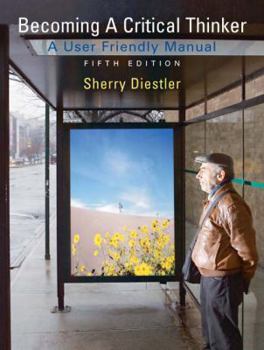Becoming a Critical Thinker: User Friendly Manual (5th Edition)
Select Format
Select Condition 
Book Overview
For courses in Critical Thinking, Informal Logic, Rhetoric, Argumentation, and English courses which cover the Argumentative Essay. This text trains students to distinguish high-quality,... This description may be from another edition of this product.
Format:Paperback
Language:English
ISBN:0132413132
ISBN13:9780132413138
Release Date:January 2008
Publisher:Pearson
Length:496 Pages
Weight:1.55 lbs.
Dimensions:9.2" x 0.9" x 7.0"
Related Subjects
Behavioral Sciences Cognitive Cognitive Psychology College & University Education Education & Reference Education Theory Educational Psychology Health, Fitness & Dieting Health, Fitness & Dieting Humanities Instruction Methods Pedagogy Philosophy Politics & Social Sciences Psychology Psychology & Counseling Schools & Teaching Science & Math TextbooksCustomer Reviews
3 ratings
Becoming a Critical Thinker
Published by Thriftbooks.com User , 17 years ago
The book arrived right on time for my class to start. There were no problems with it all.
Arsenal For Attacking Flawed Presentations
Published by Thriftbooks.com User , 22 years ago
A presentor is usually happy when people pose questions, as long as they are not critical questions. Most of the time the audience doesn't pose any questions because they simply don't know what questions to ask or how to formulate those questions.The prinicipal points of this book:Establishing the issue and the conclusion.- Knowing and agreeing with the counterpart on the issue prevents us from veering off away from the subject of discussion. People like chaning the issue when they feel trapped.- Listening to the person's conclusion about the mentioned issue which will indicate the person's opinion.What are the reasons for their arguments on a certain suject?- Reasoning takes many roads but often we don't know how to counter weak reasoning. Key words that give way to faulty reasoning with no substance to back up the argument.Finding words that are ambiguous- Counterparts discussing a subject, saying the same thing with several key words but some words have many meanings. Make sure you are talking about the same thing.What are the value conflicts and assumptions?- Value conflicts are explosive because of different political, religous and moral beliefs. A speaker who is devoutly religious will try and bring biblical arguments in to reasoning which for someobdy who is an athiest, would mean absolutely nothing. How good is the evidence: Appeals to authority and testamonials.- Probably one of the most abused factors in supporting an argument. How often have you heard, "Experts on the subject state 70% of medical doctors say x,y and z habits are great for your health". Don't forget to ask who the authority is. The more general authority and testamonials are the weaker the argument. The authors of many surveys make them biased. e.g. If scientific study has proven that smoking is good for your health and the author of the article is a lobbyist for the tobbaco industry, could it be possible that the author has something to gain from the study? If so ask what other authors or experts say about the subject. The so called industry specific gurus who give their testamonials are in most cases biased, because they have something to gain with the report.Deceptive statistics are also factors that need to be examined closely. When a presentor starts talking about averages and percentages, ask which average and how large the sampeling was on people who took the survey. You would be surprised about how many presentors do not know anything about the facts they are presenting.The author does not only wirte about critical thinking but has included many exercises to acitvate the reader to look for faulty reasoning and how to build up questions to counter evidence being presented. It is a great introduction text to critical thinking.
Teaching Students to THINK!
Published by Thriftbooks.com User , 24 years ago
I first utilized this excellent book in undergraduate classes about a year ago.I enjoyed using it and it received accolades from the students, (once they realized that sometimes, thinking is WORK!)It is "user-friendly", and the segments in each chapter are short but concise. There are numerous exercises after each section so that the student can put to immediate use, their newly acquired knowledge.But I believe the highest praise came from the students that jokingly complained, "I can't think the same way anymore!" They had become "Critical Thinkers". And we can certainly use all of those that we can get!





